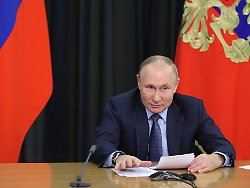Wednesday, December 8th, 2021
Reactions to the Scholz government
China wants “new level” – Moscow wants further dialogue
China is looking forward to the new government in Berlin taking office. They want to have the relationship on a new level, it is said from Beijing. Moscow is more reserved and hopes to keep the conversation going. Both countries are likely to be among the greatest tasks for the new government.
Shortly after Olaf Scholz was sworn in, heads of state around the world have high expectations of him. The leadership in Beijing is striving for a “new level” of German-Chinese cooperation with the new federal government under Scholz. “China is ready to consolidate and deepen mutual political trust and to expand exchanges and cooperation with Germany in various areas,” said President Xi Jinping, according to the state-run Chinese news agency Xinhua. Russian head of state Vladimir Putin expressed the hope for “constructive” relations with the new traffic light government in Berlin.
Xi spoke out in favor of “taking bilateral relations to a new level”. He congratulated Scholz on his election as Federal Chancellor and recalled that in the past both countries had “looked for common ground” despite their differences.
Russian President Putin said he was looking forward to “entering into a constructive dialogue” with Scholz. This would “undoubtedly correspond to the fundamental interests of Russians and Germans and contribute to strengthening stability and security at regional and global level,” he added. According to Kremlin spokesman Dmitri Peskov, Russia is betting “that the German side will continue to take the position that there is no alternative to dialogue in order to overcome even the most difficult differences”.
But Putin’s opponent in the Ukraine conflict, President Volodymyr Selenskyj, also has hopes for Olaf Scholz as the new German Chancellor. He was ready to work with Scholz on “restoring the territorial integrity of Ukraine, developing the energy partnership and our (r) EU / NATO integration,” wrote the head of state on Twitter. Prime Minister Denys Schmyhal also sent congratulations on Twitter.
Biden demands more distance from China and Russia
Relations between Berlin and Kiev have deteriorated because of the controversial Russian natural gas pipeline Nord Stream 2 through the Baltic Sea to Germany. The German government has so far stuck to the project despite sharp international criticism and pressure from the USA. Ukraine will lose its status as the main transit country for Russian gas to the EU and billions in revenue after commissioning, which is expected in 2022.
Scholz and his ministers from the SPD, Greens and FDP are now in office. First of all, Scholz was elected to succeed Chancellor Angela Merkel in the Bundestag that morning. He then received his certificate of appointment from Federal President Frank-Walter Steinmeier.
For the new traffic light government, dealing with the great powers China and Russia is one of the greatest foreign policy challenges. China is Germany’s most important trading partner. However, there are regularly differences in questions of democracy and human rights. The People’s Republic has come under massive international criticism, among other things for its actions against the Uyghurs in the province of Xinjiang. Western states and human rights organizations accuse Beijing of massive repression of members of the Muslim minority. During her tenure, Merkel was accused of not criticizing Beijing’s handling of human rights clearly enough out of consideration for trade relations with China.
At a NATO summit in June, US President Joe Biden urged European partners to focus more on China. Merkel warned at the time that “the right balance must be found” in dealing with the People’s Republic. China is a rival on many issues, but also a partner at the same time. Relations between the West and Russia have been at a low point for a long time; the Ukraine conflict is currently the main focus. The USA and its European allies fear a military escalation in the face of massive Russian troop movements on the border with Ukraine.
At a video summit on Tuesday, Biden threatened Putin with tough economic sanctions if Russia attacked Ukraine. He received support from Germany and other European partners. The new Foreign Minister Annalena Baerbock recently announced a tougher course against authoritarian states such as China and Russia. “For me, a value-based foreign policy is always an interplay of dialogue and toughness,” said Baerbock of the “taz”. Alluding to the outgoing government under Chancellor Merkel, she added: “Elaborate silence is not a form of diplomacy in the long run, even if some have seen it that way in recent years.”
